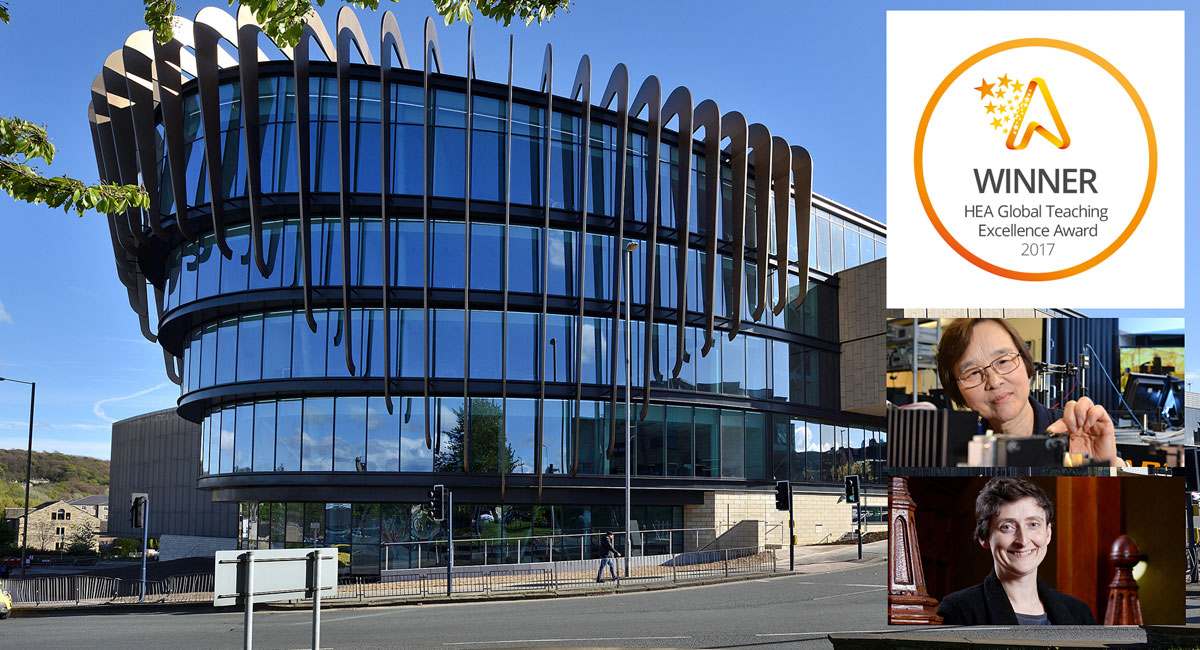 Pictured the University's new £28m Oastler building and Honours recipient Professor Dame Xiangqian Jiang and 2017 National Teaching Fellow Dr Elizabeth Dobson
Pictured the University's new £28m Oastler building and Honours recipient Professor Dame Xiangqian Jiang and 2017 National Teaching Fellow Dr Elizabeth DobsonIt was a golden year for the University of Huddersfield
Teaching Awards
IN August 2017, it was announced that the excellence of its education had earned a coveted Gold Award in the new Teaching Excellence Framework (TEF). Huddersfield is one of only two universities in Yorkshire and the Humber to receive this, confirming it as one of the top educational institutions in the UK.
Factors such as highly-qualified staff, individualised learning support and rapid feedback on coursework propelled the University into the top category of the TEF, which was introduced by the UK Government in order to “provide clear information to students about where the best provision can be found”.
TEF Gold was followed up by victory for Huddersfield at the inaugural Global Teaching Excellence Awards, organised by the UK-based Higher Education Academy (HEA). A 17-strong judging panel – including several professors – from nine countries examined the highly-detailed submissions from 27 shortlisted entrants, who were required to describe their institutions, mission and leadership and to provide evidence for teaching excellence.
Huddersfield also cemented its place as the past decade’s most successful university in a prestigious UK teaching awards scheme, when it was announced that Senior Lecturer in Music Technology Dr Elizabeth Dobson had been awarded a 2017-18 National Teaching Fellowship by the Higher Education Academy. She is the 15th University of Huddersfield academic to receive one of the fellowships since 2008.
The most notable honour earned by an individual at the University in 2017 was the Damehood conferred on Professor Xiangqian Jiang. It was a reward for her global reputation in metrology – the science of measurement – plus her contribution to British-based engineering and advanced manufacturing.
Professor Jiang is now the director of the £40 million Future Metrology Hub, officially launched in September at an event attended by more than 130 scientists, engineers, academics and industrialists from around the UK.
The launch took place in the University’s £28 million Oastler Building. It came into use at the start of 2017 and was officially opened by the University’s Chancellor, HRH The Duke of York. The architecturally-dramatic building provides a new home for Law School and the Humanities department, and its state-of-the-art conference and meeting facilities have been heavily used.
Visitors
A sequence of national and international academic conferences have taken place in the Oastler, and public events there have included the 2017 Harold Wilson Lecture, at which former Archbishop of Canterbury Dr Rowan Williams drew a record audience.
HRH The Duke of York returned to the Oastler Building for the regional launch of his new project entitled Inspiring Digital Enterprise Awards (iDEA), which aims to burnish the digital skills and employability of young people in the UK.
The University’s Emeritus Chancellor, the famous actor Sir Patrick Stewart, also paid a return visit, and over the course of two days he met a wide variety of students, from engineers to actors, and drew big audiences for Q&A sessions.
Research successes
He also met Professor Adele Jones and her colleagues whose None-in-Three project has been awarded £4.3 million from the UK Government’s Global Challenges Research Fund in order to develop pro-social computer games that are tailored to tackle issues of domestic abuse in countries around the world.
There were also major boosts for other centres at the University, including the Institute of Railway Research, a partner in the new UK Railway Research and Innovation Network, aimed at establishing the UK as a world leader in rail technology. Research funding of almost £30 million will flow into the Institute.
Other substantial funding awards included more than £2 million from the European Research Council for Professor Michael Clarke to carry out research that aims to transform the analysis of music.
There have been many collaborations with industry, and during 2017 the University notched up its 100th Government-backed Knowledge Transfer Partnership. These enable ambitious companies to harness the research expertise of the University’s staff and students.
